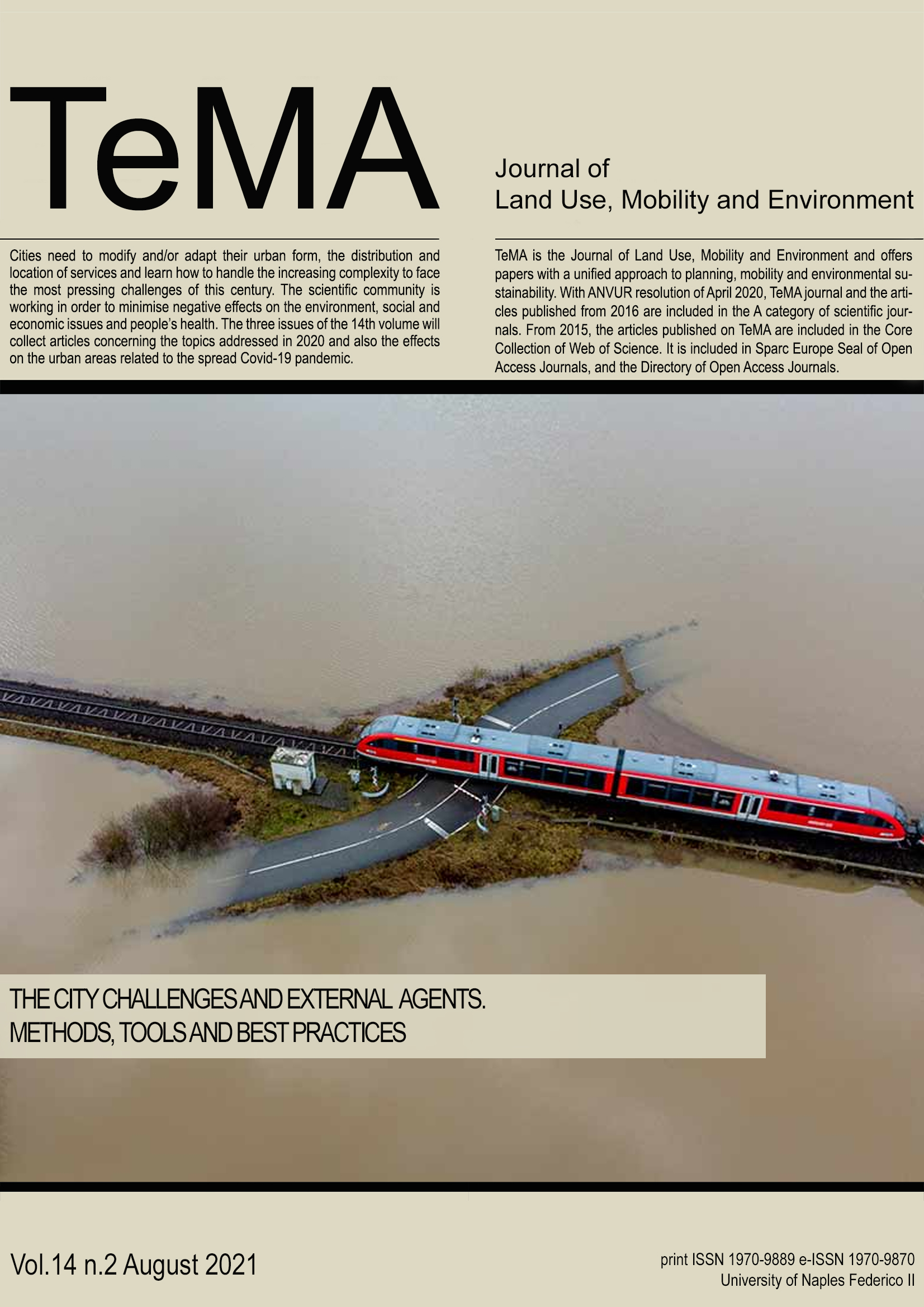Ecological transition: perspectives from U.S. and European cities
Abstract
Starting from the relationship between urban planning and mobility management, TeMA has gradually expanded the view of the covered topics, always remaining in the groove of rigorous scientific in-depth analysis. This section of the Journal, Review Notes, is the expression of a continuous updating of emerging topics concerning relationships between urban planning, mobility and environment, through a collection of short scientific papers written by young researchers. The Review Notes are made of four parts. Each section examines a specific aspect of the broader information storage within the main interests of TeMA Journal.
In particular, the Urban planning literature review section aims at presenting recent books and journals, within global scientific panorama, on selected topics and issues.
This contribution proposes a further insight into the complex ecological transition, with a focus to U.S. and European cities. Cities have faced a worldwide health and economic crisis due to the outbreak of a new coronavirus in 2019 and now, with progressive and massive vaccination and never experienced financial tools, a new era seems to start: significant financial resources, plenty of room for economic maneuvers may turn the ongoing pandemic into an opportunity, for the following years, to build more sustainable societies and environments. Within this scenario, urban areas play an essential role. According to shared and universal goals to achieve a more sustainable model of society and economy, how ecological transition is run by policymakers, stakeholders and citizens strongly depends on cities' backgrounds and structures.
Downloads
References
Badr, H. S., Du, H., Marshall, M., Dong, E., Squire, M. M., & Gardner, L. M. (2020). Association between mobility patterns and COVID-19 transmission in the USA: a mathematical modelling study. The Lancet Infectious Diseases, 20(11), 1247-1254. https://doi.org/10.1016/S1473-3099(20)30553-3
Borkowski, P., Jażdżewska-Gutta, M., & Szmelter-Jarosz, A. (2021). Lockdowned: Everyday mobility changes in response to COVID-19. Journal of Transport Geography, 90, 102906. https://doi.org/10.1016/j.jtrangeo.2020.102906
EPA – United States Environmental Agency (2020). Inventory of U.S. Greenhouse Gas Emissions and Sinks: 1990-2019. Retrieved at: https://www.epa.gov/sites/default/files/2021-04/documents/us-ghg-inventory-2021-main-text.pdf
Gao, S., Rao, J., Kang, Y., Liang, Y., & Kruse, J. (2020). Mapping county-level mobility pattern changes in the United States in response to COVID-19. SIGSpatial Special, 12(1), 16-26.
Gargiulo, C., Pinto, V., & Zucaro, F. (2012). City and mobility: towards an integrated approach to resolve energy problems. TeMA - Journal of Land Use, Mobility and Environment, 5(2), 23-54. https://doi.org/10.6092/1970-9870/920
Guida, C., & Natale, F. (2021). Ecological transition: which transactions?. TeMA - Journal of Land Use, Mobility and Environment, 14(1), 93-98. https://doi.org/10.6092/1970-9870/7878
Hendrickson, C., & Rilett, L. R. (2020). The COVID-19 pandemic and transportation engineering. Journal of Transportation Engineering, Part A: Systems. Vol. 146, Issue 7 (July 2020) https://doi.org/10.1061/JTEPBS.0000418
Laurent, É. (2021). The European Green Deal: from growth strategy to social-ecological transition. Vanhercke B., Spasova S. and Fronteddu B.(eds.). Retrieved at: https://www.etui.org/sites/default/files/2021-01/07-Chapter5-The%20European%20Green%20Deal.pdf
Nouvellet, P., Bhatia, S., Cori, A. et al. Reduction in mobility and COVID-19 transmission. Nature Communication 12, 1090 (2021). https://doi.org/10.1038/s41467-021-21358-2
Meng, F., Guo, J., Guo, Z., Lee, J. C., Liu, G., & Wang, N. (2021). Urban ecological transition: The practice of ecological civilization construction in China. Science of The Total Environment, 755, 142633. https://doi.org/10.1016/j.scitotenv.2020.142633
Schmidt, K., Sieverding, T., Wallis, H., & Matthies, E. (2021). COVID-19–A window of opportunity for the transition toward sustainable mobility?. Transportation Research Interdisciplinary Perspectives, 10, 100374. https://doi.org/10.1016/j.trip.2021.100374
Śleszyński, P., Nowak, M., & Blaszke, M. (2020). Spatial policy in cities during the Covid-19 pandemic in Poland. TeMA - Journal of Land Use, Mobility and Environment, 13(3), 427-444. https://doi.org/10.6092/1970-9870/7146
Copyright (c) 2021 TeMA - Journal of Land Use, Mobility and Environment

This work is licensed under a Creative Commons Attribution 4.0 International License.
Authors who publish in this journal agree to the following:
1. Authors retain the rights to their work and give in to the journal the right of first publication of the work simultaneously licensed under a Creative Commons License - Attribution that allows others to share the work indicating the authorship and the initial publication in this journal.
2. Authors can adhere to other agreements of non-exclusive license for the distribution of the published version of the work (ex. To deposit it in an institutional repository or to publish it in a monography), provided to indicate that the document was first published in this journal.
3. Authors can distribute their work online (ex. In institutional repositories or in their website) prior to and during the submission process, as it can lead to productive exchanges and it can increase the quotations of the published work (See The Effect of Open Access)

